July 22, 2024 – the 80th Birthday Celebration of Anglican Bishop Park KyungJo and Interview about the late Rev. Kang WonYong
Hello. Today is the day for an interview about the Religious People’s Meeting for National Reconciliation and Peace and the late Rev. Kang WonYong in Seoul.
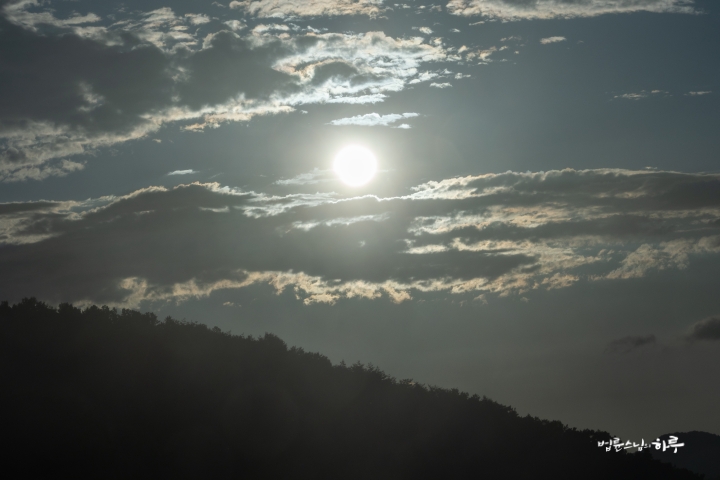
After finishing his morning practice and meditation, Sunim departed from Dubuk Retreat Center at 5:50 AM and headed to Seoul. As he approached Seoul, a light drizzle began to fall.
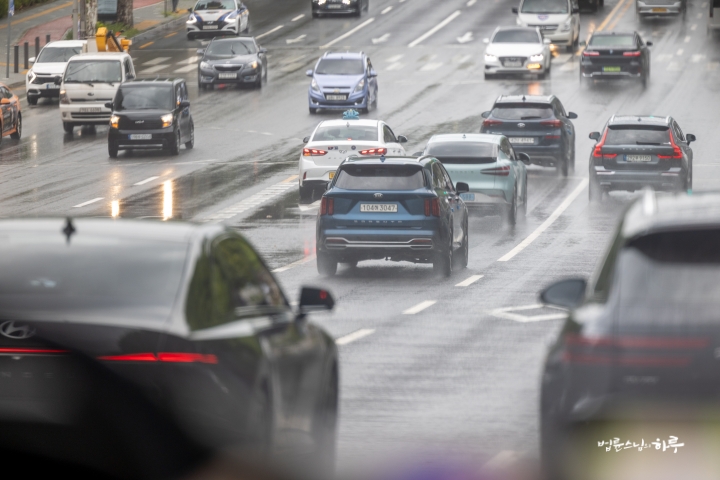
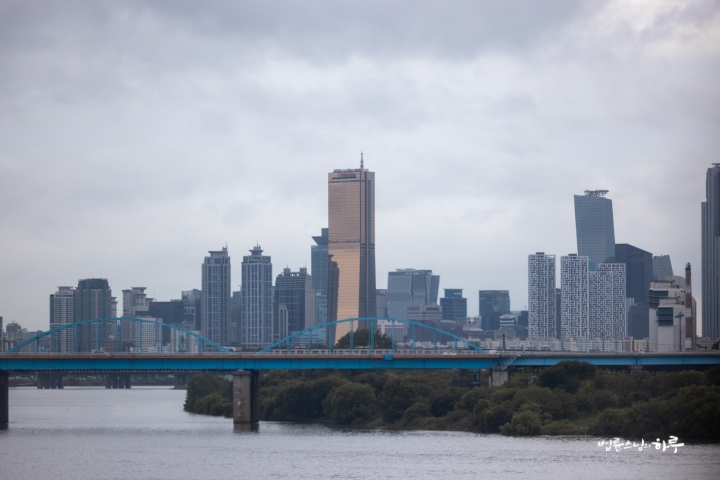
After driving on the highway for four hours, he arrived at the Seoul Jungto Center just after 10 AM. After unloading his luggage, he immediately headed to the Seoul Cathedral of the Anglican Church of Korea, located in Sejongno.
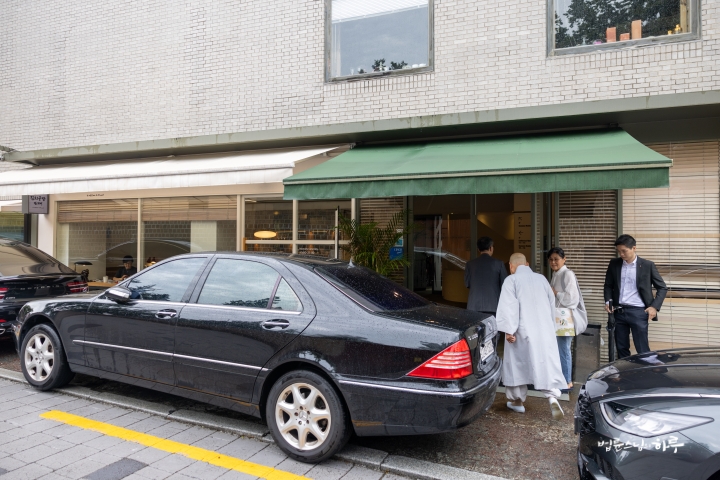
Anglican Bishop Park, KyungJo, who is part of the Religious People’s Meeting for National Reconciliation and Peace, proposed to host a lunch to celebrate his 80th birthday this year. He specifically requested Sunim’s attendance, so the appointment was scheduled for the day after Sunim returned from his overseas schedule.
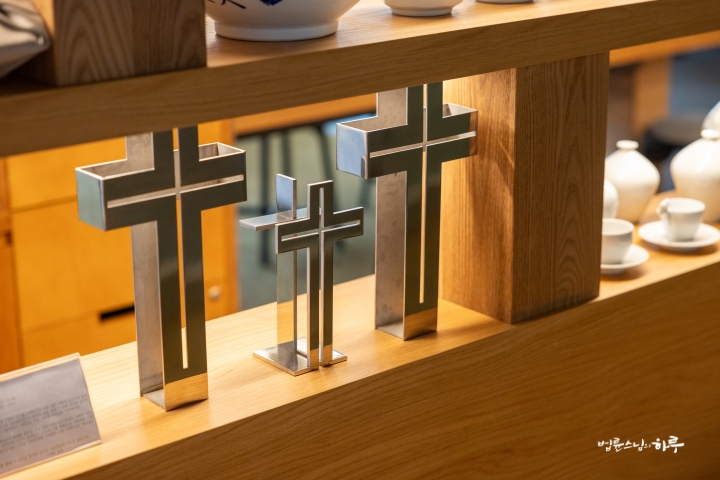
At noon, everyone gathered at a restaurant right in front of the Seoul Cathedral. Sunim greeted the pastors, priests, and bishops with warm handshakes.
“How have you been?”
“I just returned yesterday after visiting 10 Asian countries for a month.”
“You’re always busy.”
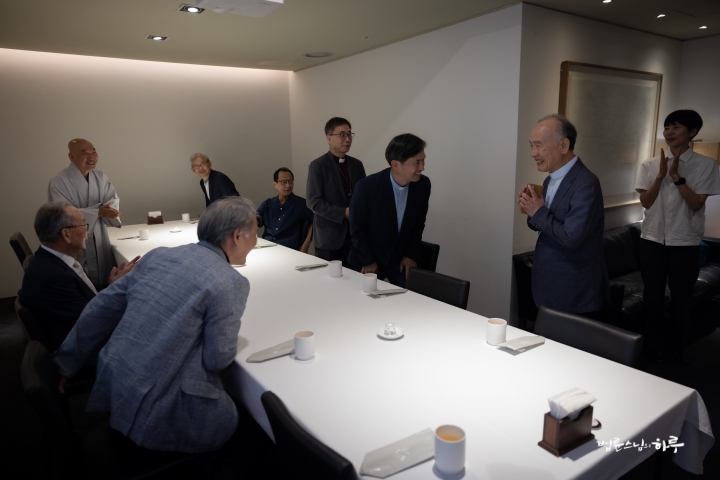
As everyone took their seats, the bishop expressed his gratitude.
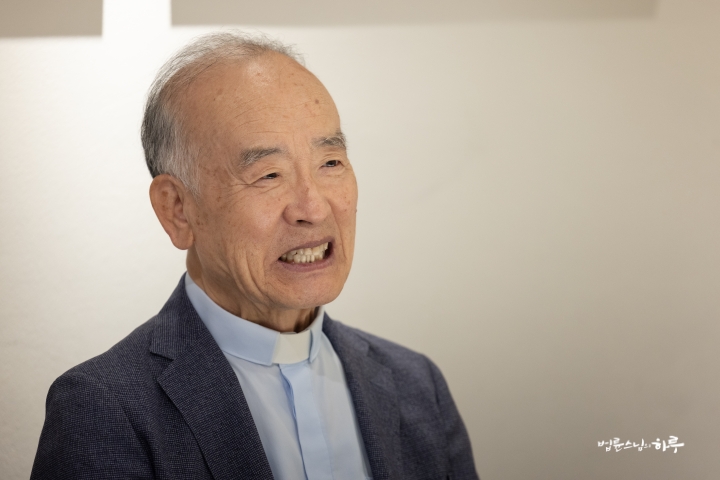
“Thank you for making time despite your busy schedule. The current bishop and the bishop-elect of our Anglican Church are also here today. Would our current bishop lead us in a prayer before the meal?”
Bishop Lee, KyungHo, the 6th diocesan bishop of the Anglican Church of Korea’s Seoul Diocese, led the prayer.
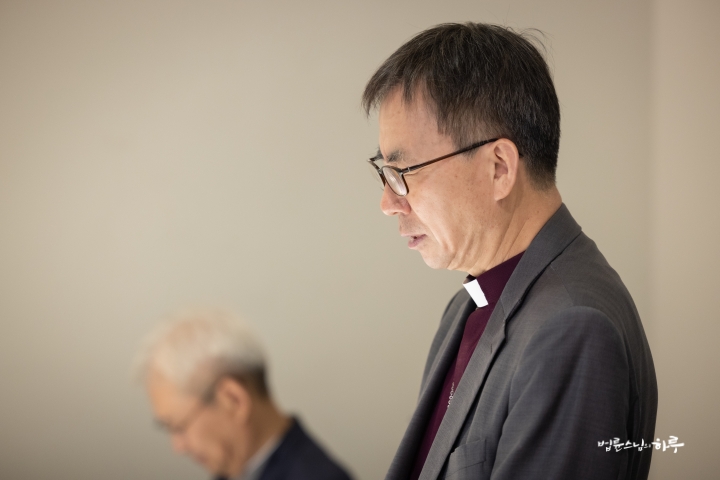
“Holy and merciful Lord, we remember the wonderful works You did when You came to this land, embracing and feeding the poor people living in barren lands with all Your heart and soul, cultivating the Kingdom of God. We are especially grateful for this precious time of gathering with the elders of various religious orders who have been working for reconciliation and peace between North and South Korea since 1998. We hope that all the efforts made together beyond religious boundaries will be a valuable foundation for cultivating peace and reconciliation in this land. We especially prepared this gathering to celebrate Bishop Park Kyung-jo’s 80th birthday. We are grateful for the grace and love we have shared so far. Please guide us to live more blessed lives through this good fellowship and sharing. We pray in the name of our Lord Jesus.”
“Amen!”
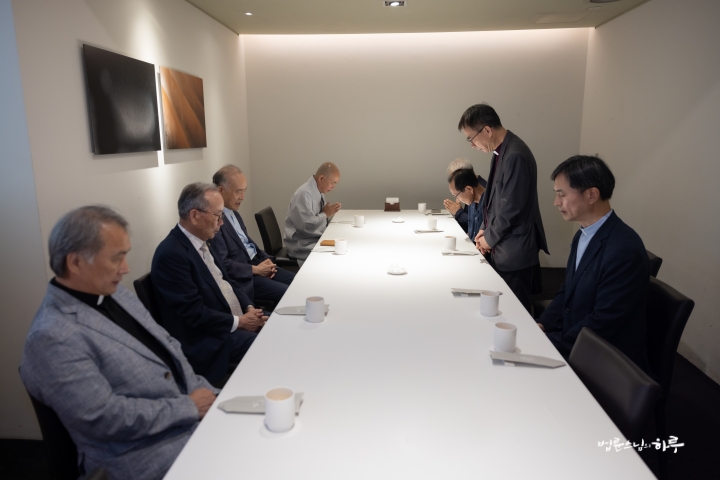
Once again, Sunim said “Amen!” in the loudest voice.
First, Chief Priest Park NamSoo, the chair of the Religious People’s Meeting, conveyed his congratulations for Bishop Park KyungJo’s 80th birthday, followed by Sunim expressing his congratulatory thoughts. Sunim also briefly introduced the path that the Religious People’s Meeting has walked to the current bishop and the bishop-elect.
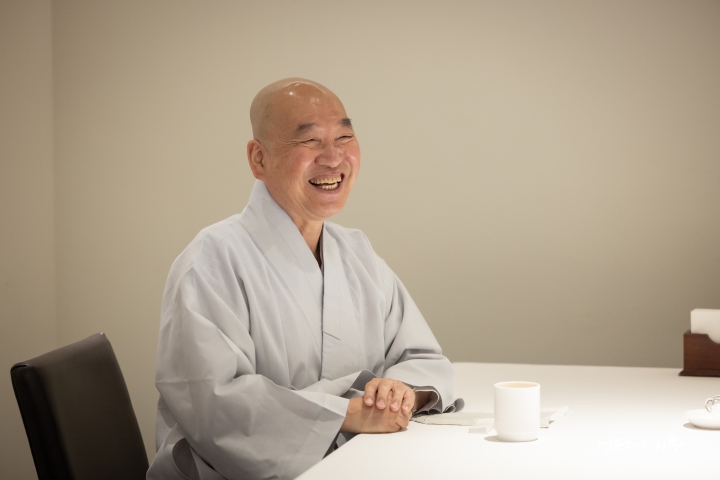
“It’s been almost 30 years since we first met like this. We first met in 1998 when we were working on the North Korean aid movement. Despite our different religions, we have consistently worked together without ever causing conflicts due to religion. We have always formed a consensus and worked together on issues of social justice, including environmental movements, peace movements, and humanitarian aid. I think the reason we’ve been able to work together consistently until now is especially thanks to Pastor Kim Myung-hyuk, who participated with an inclusive attitude despite being the president of the Korea Evangelical Fellowship, representing the conservative Christian community. Because of his presence, we were able to have diversity, and I think it allowed the Religious People’s Meeting to appear moderate to outsiders.
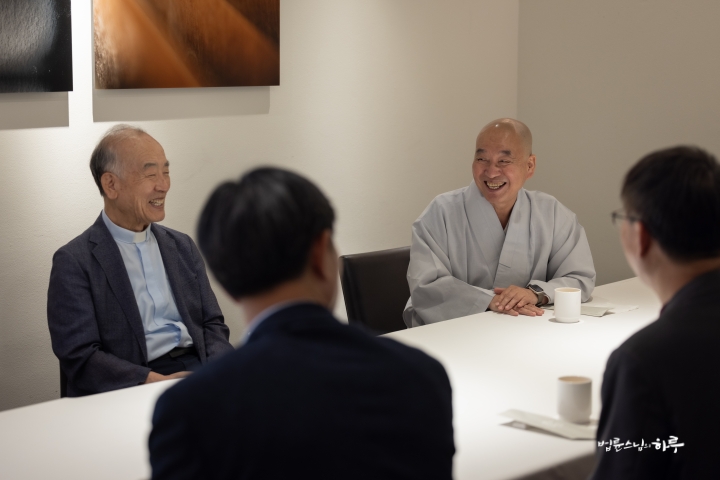
Moreover, Bishop Park Kyung-jo has been crucial in maintaining the center of the Religious People’s Meeting for National Reconciliation and Peace until now. Generally, people tend to become somewhat conservative as they age, even if they were progressive in their youth. However, looking at Bishop Park Kyung-jo’s statements over the years, his perspective has always been oriented towards social justice, consistently maintaining a progressive stance. When I think of the late Rev. Kang Won-yong, I remember that his thoughts remained progressive until the end, even as his body aged. That’s why I always have deep respect for Bishop Park Kyung-jo. Once again, congratulations on your 80th birthday.”
Taking Sunim’s words, Bishop Park KyungJo shared a few words.
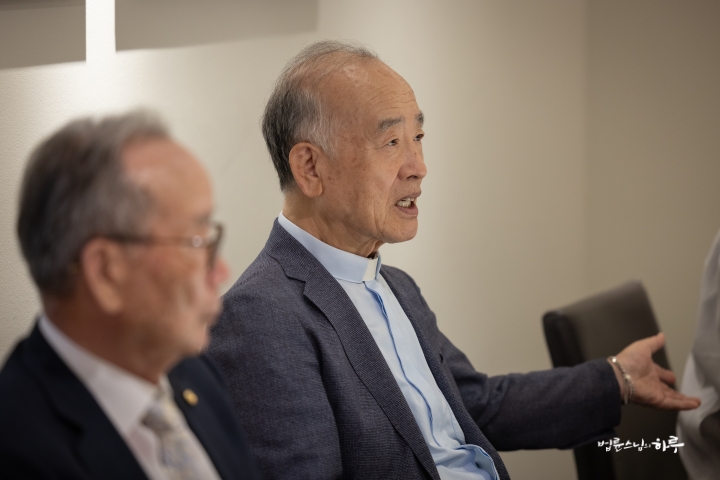
“Whenever we have meetings at the Peace Foundation, the late Pastor Kim Myung-hyuk always led us in prayer before meals. And the one who always said ‘Amen!’ the loudest after the prayer is our Venerable Pomnyun Sunim. I found that quite impressive. Pastor Kim often said this:
‘The person I respect most in the world is Venerable Pomnyun Sunim. I’ve observed him for decades, and his life itself is truly admirable.’
He spoke like this without hesitation. So I also watched carefully, wondering if it was really true, and I saw that Sunim is always busy visiting poor areas, traveling around the world giving Dharma talks, and going to the U.S. Congress and government to appeal for peace on the Korean Peninsula. Watching this, I’ve learned a lot and developed a great respect for him as well.”
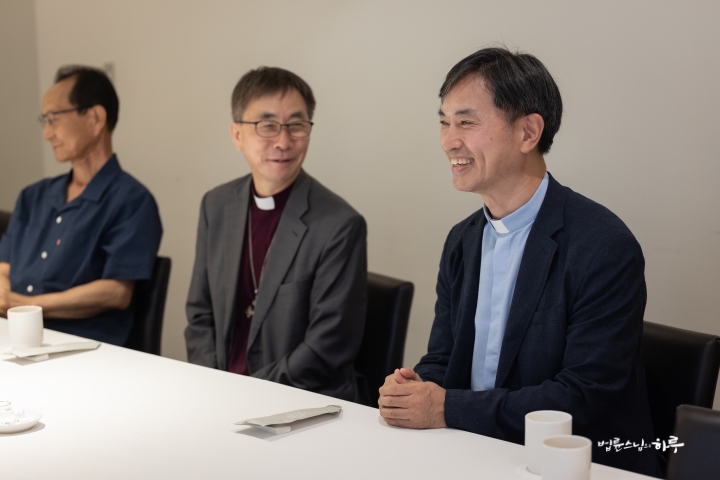
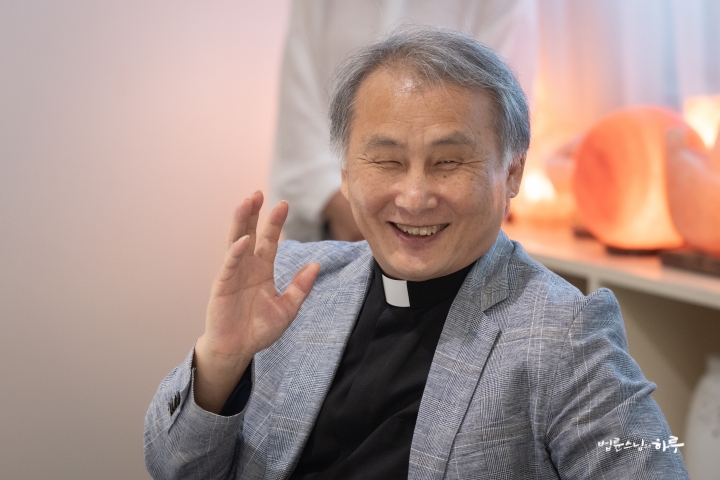
Then Pastor Park JongHwa, Father Kim HongJin, and Chief Priest Kim DaeSeon also shared a few words of congratulations for the bishop.
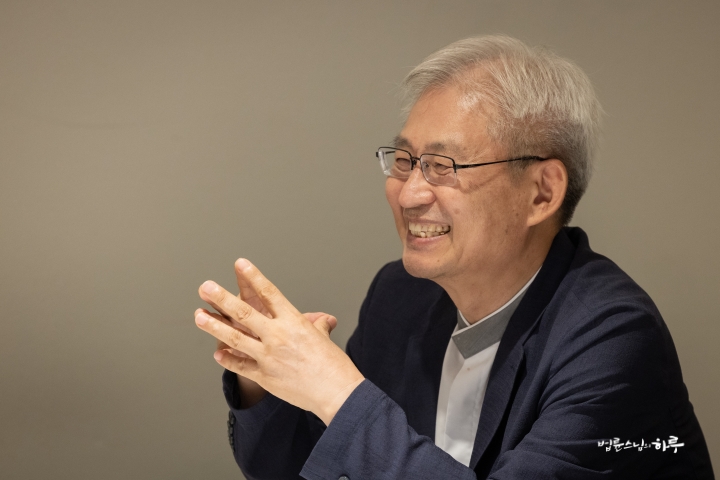
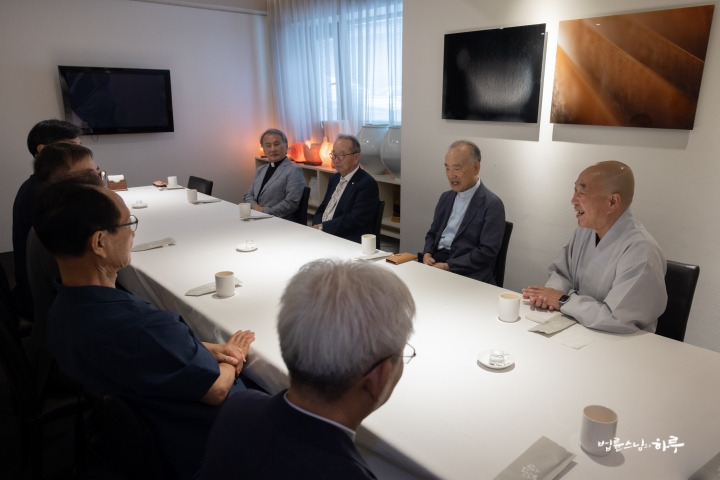
Especially with the current bishop and the bishop-elect present, many words of blessing were shared for the development of the Anglican Church.
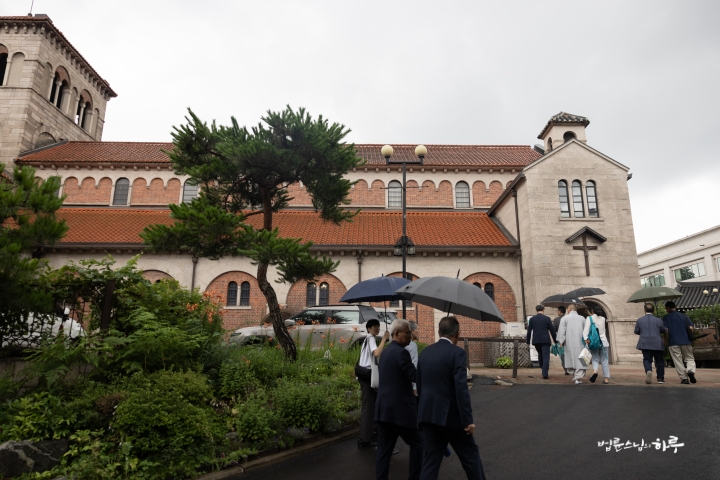
“Shall we take a look at our cathedral? Our current bishop will provide an explanation.”
After finishing the meal, everyone moved to the Seoul Cathedral of the Anglican Church of Korea.
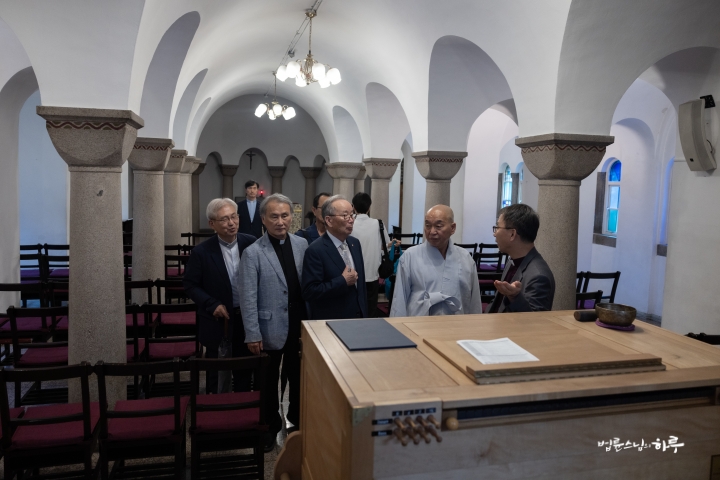
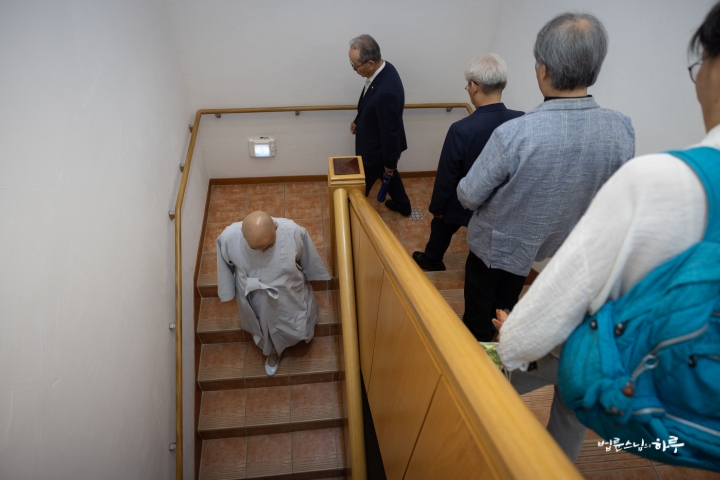
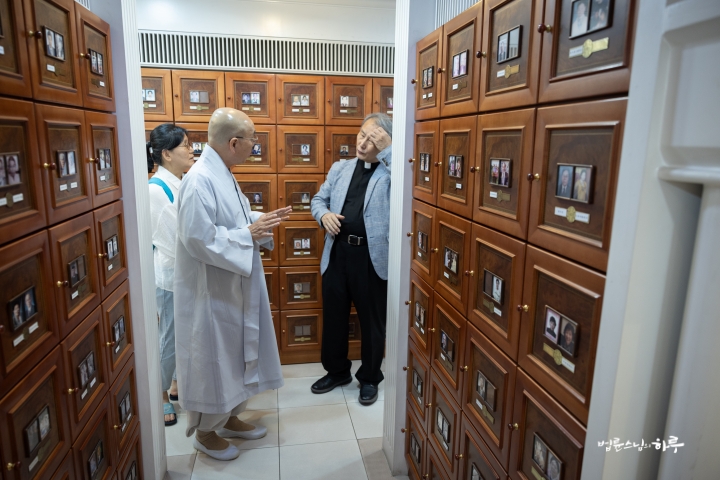
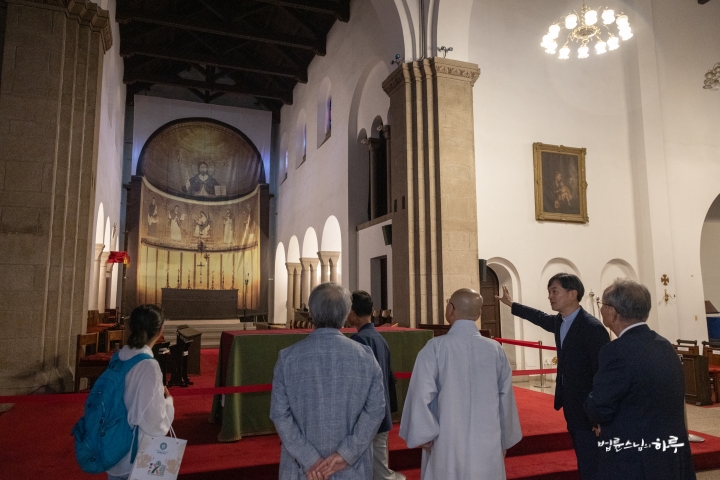
After looking around the inside of the cathedral and examining the columbarium in the basement, they headed to the chapel.
“This cathedral wasn’t built all at once. It was expanded bit by bit – once in 1926, once in 1966, and once in 1992.”
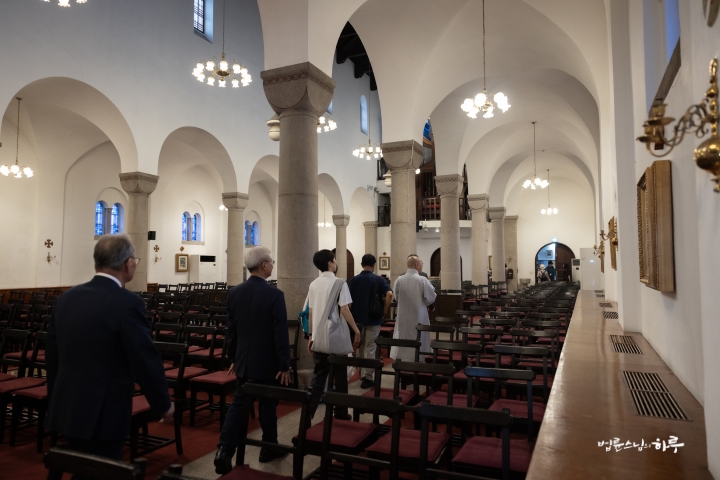
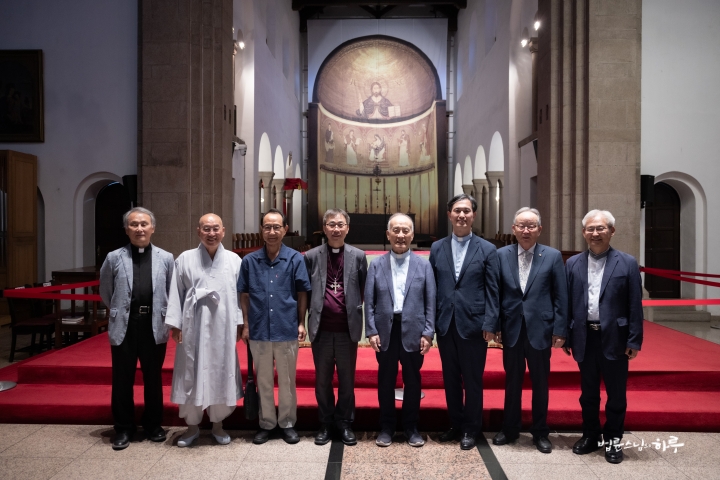
Everyone took a commemorative photo together inside the chapel.
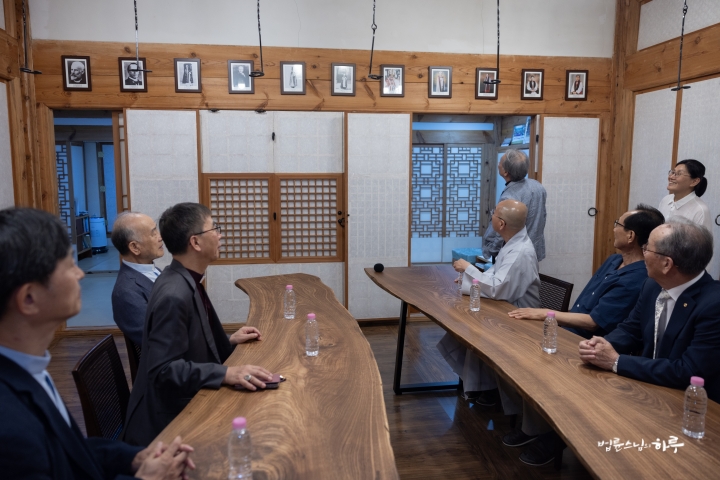
After touring the chapel, they headed to the hanok building that the bishop uses as his office.
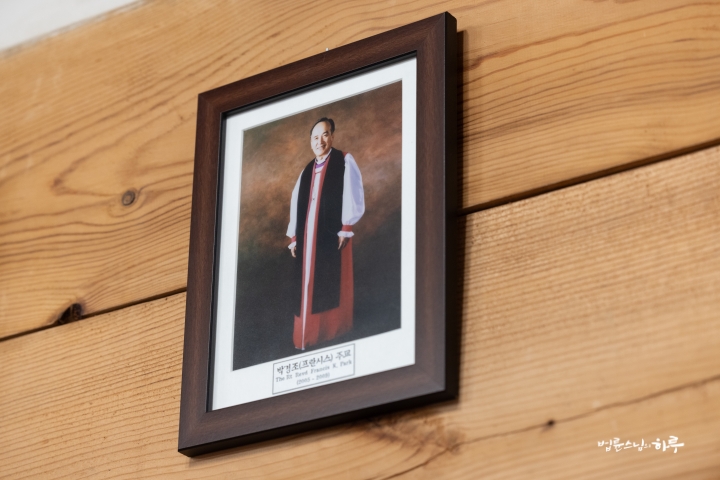
“The Anglican Church of Korea began in 1890 when Bishop Corfe purchased a church hanok and land at the current location. This hanok was named ‘Jangrim Cathedral’ and the first Christmas Eucharist was celebrated here. At that time, the most necessary work was caring for orphans and sick people, so we started by building an orphanage and a hospital first. The cathedral was built last.”
Inside the hanok building, photos of past Anglican bishops were hanging. Bishop Park KyungJo served as the 4th diocesan bishop, and Bishop-elect Kim JangHwan will become the 7th diocesan bishop.
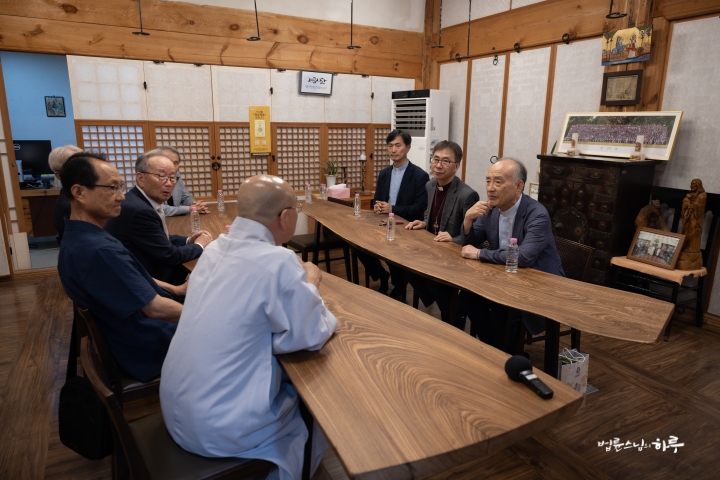
The bishop-elect will receive his episcopal ordination in September, and he handed out invitations to the enthronement ceremony to all members of the Religious People’s Meeting.
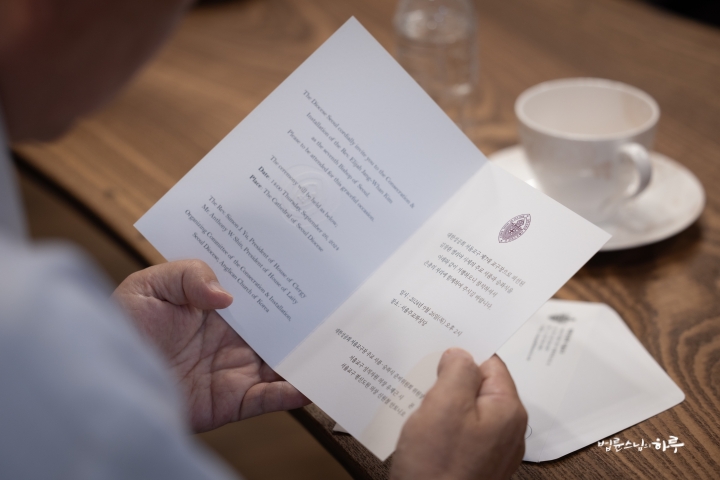
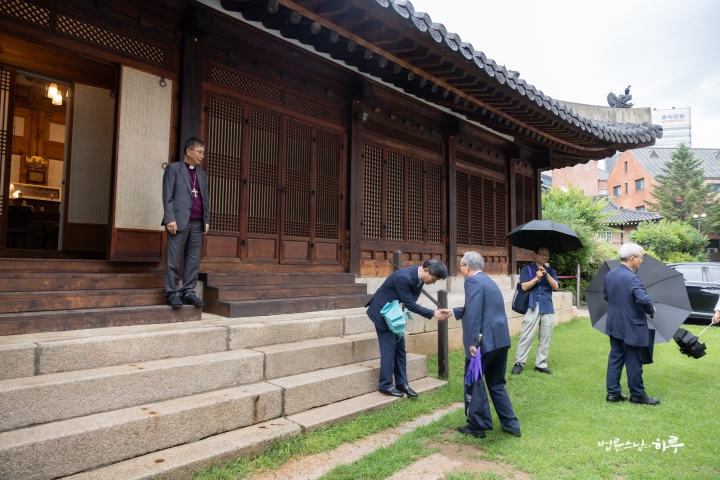
Agreeing to meet again at the Religious People’s Meeting at the Peace Foundation the day after tomorrow, Sunim headed back to the Seoul Jungto Center at 2:30 PM.
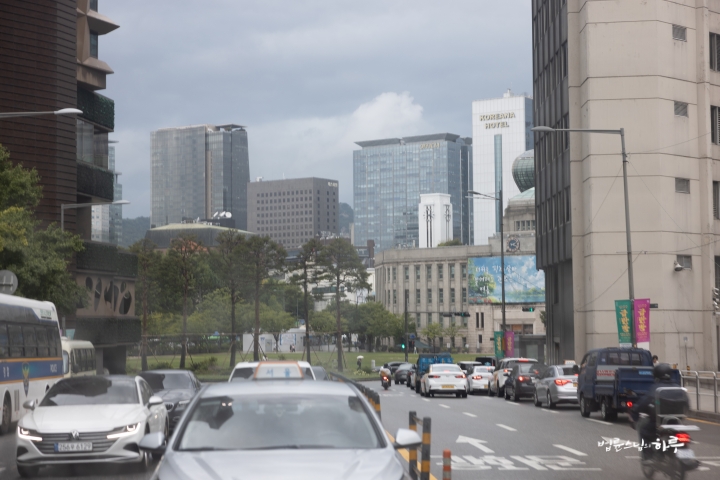
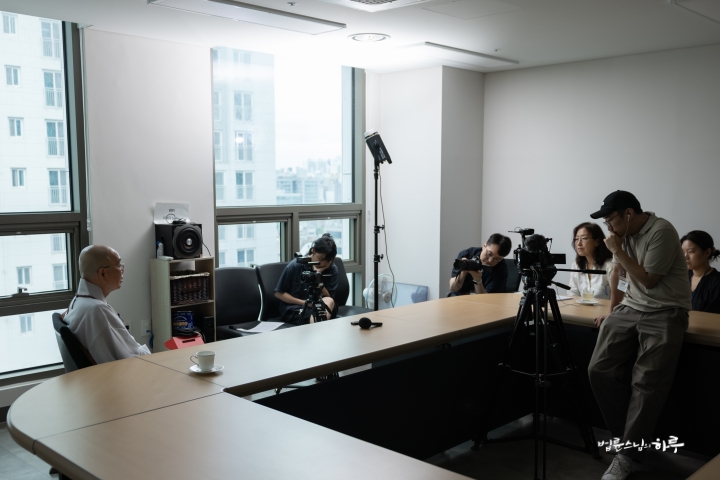
At 3 PM, the “With Yeohae” Foundation came to the Jungto Center to interview Sunim. “With Yeohae” is an organization that started as the “Christian Academy” in 1965, advocating for Christian social participation and leading various dialogue meetings to overcome the problem of human alienation in modern society. As the founder of the organization, the late Rev. Kang WonYong had a special connection with Venerable Pomnyun Sunim, so Sunim gladly agreed to the interview.
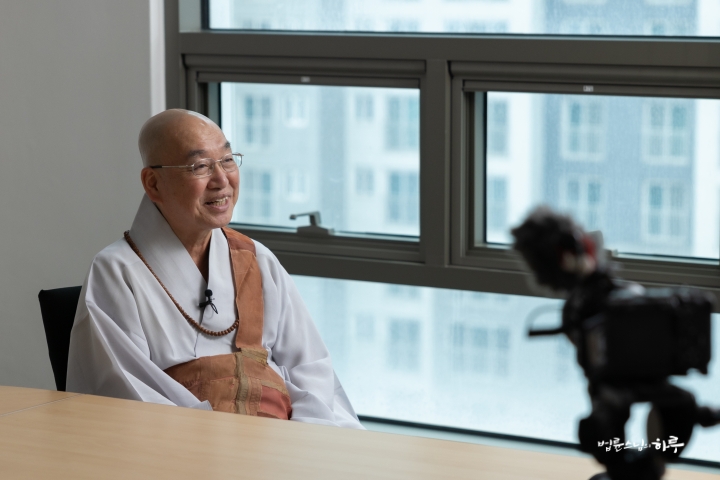
After setting up the filming equipment, the interview was conducted in the 10th floor conference room of the Peace Foundation. Sunim comfortably answered various questions about his connection with Rev. Kang Won-yong, the influence of the Christian Academy on subsequent social movements, its limitations, and future directions.
How Should We Develop Interfaith Dialogue and Cooperation?
“Aren’t social movements arising due to some necessity of the time? At that time, there were many conflicts between workers and capitalists, conflicts towards gender equality, conflicts between religions, so dialogue between religions, between labor and management, between women and men was much needed.
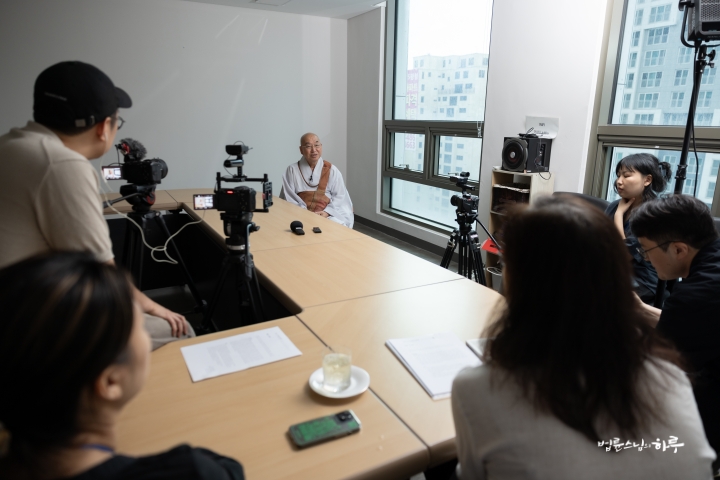
As Sunim answered the last question, he emphasized that preventing the climate crisis is of utmost importance.
What Is the Most Needed Value in Today’s Era?
“If I were to mention one thing, I believe the biggest crisis facing our society is the climate crisis. This is because it poses a threat to all beings, transcending distinctions between you and me, capital and labor, Korea and Japan, humans and other life forms. In this regard, I’d like to ask: towards what end is Korean society changing so rapidly? In the short term, the Korean Wave phenomenon and Korea’s technological advancements may seem positive, but because these developments run counter to addressing the climate crisis, I don’t consider them desirable changes. Blindly following such massive changes is like thinking the expansion of imperialism was progress, only to face eventual downfall. Within less than a century, our evaluation of these changes will be very different.
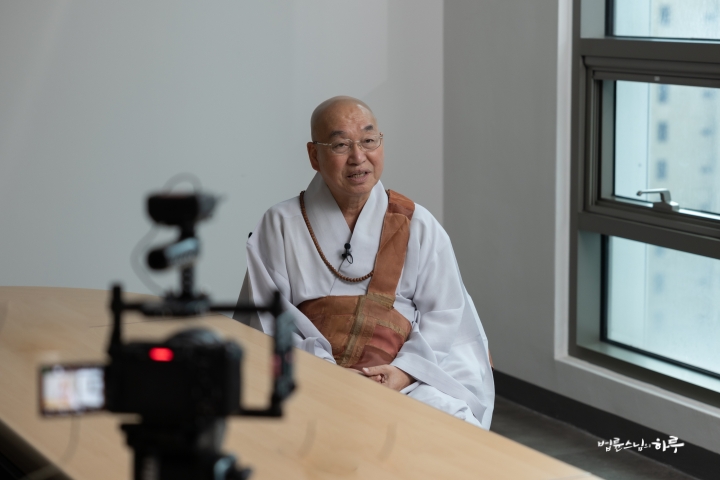
This consumerist civilization is not the path humanity should follow. Therefore, I believe we need to prepare for a new civilization where we can live CO2-zero lives to overcome the climate crisis while still being happy and free as human beings. We must abandon value systems that chase after who earns more money or who wins in competition. Just as smokers seek better cigarettes, drinkers seek better alcohol, and drug users seek better drugs, participating in this race of competition is ultimately a path to destruction. Even the best drug is worse than not using drugs at all, the best cigarette is worse than not smoking at all, and the best alcohol is worse than not drinking at all. Now is the time when we most need a fundamental change in our values.
Looking at the smaller picture within this larger framework, our greatest short-term danger is not the climate crisis but the threat of war. We are in a situation where everything could be destroyed if war breaks out tomorrow. In the short term, preventing war and maintaining peace is more important than anything else. However, in the long term, finding a new way of life that can overcome the climate crisis is of utmost importance.”
After the interview, Sunim signed his books and presented them as gifts to the foundation staff members along with Yeohae.
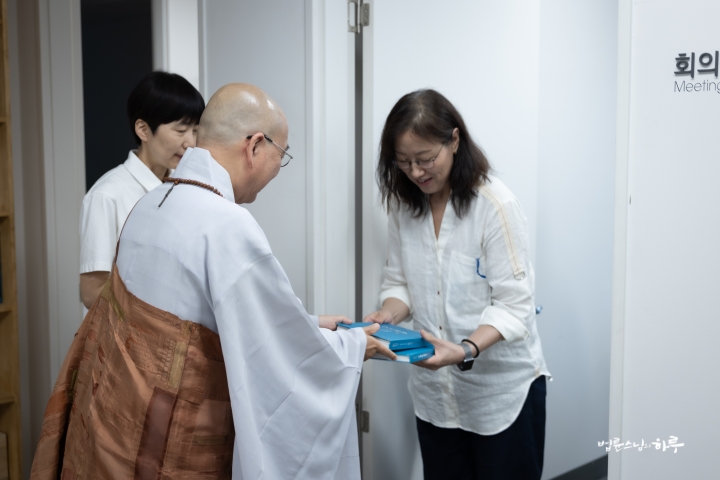
“Thank you for your hard work with the filming.”
“Thank you.”
After exchanging greetings and taking commemorative photos, Sunim headed to a lawyer’s office to notarize his will. The notarization was to donate all the land, buildings, and bank deposits under Sunim’s name to Jungto Society and the Dharma teachers.
“Having settled everything, my mind feels much lighter.”
After completing the notarization, Sunim visited an ENT clinic for treatment and then returned to the Seoul Jungto Center.
As the sun set, at 7 PM, he departed Seoul again and headed for the Seonyudong Jungto Retreat Center. After a two-hour drive, he arrived at the retreat center just after 9 PM.
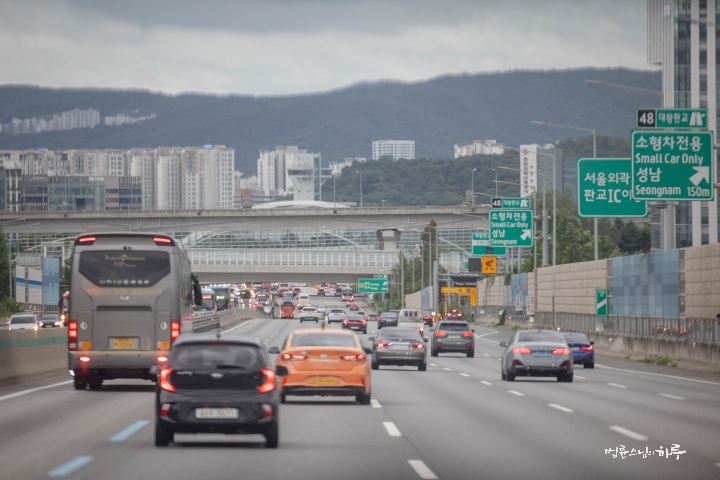
The resident Dharma teachers and staff members greeted Sunim with three bows.
“Sunim, thank you for your hard work during your month-long overseas trip.”
“Thank you all for your hard work in this heat.”
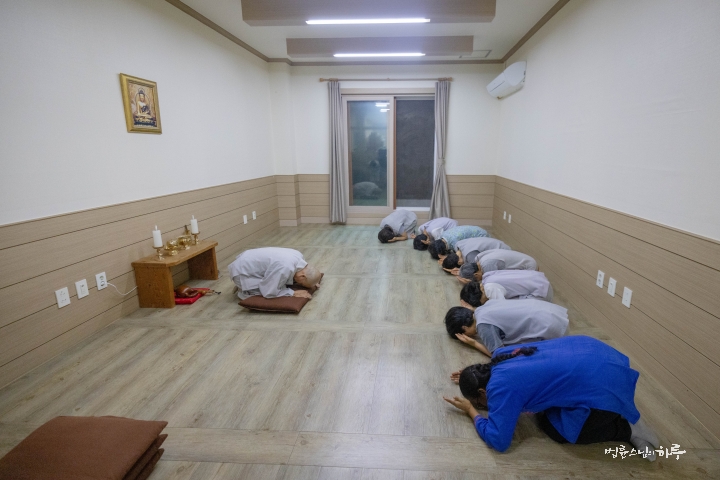
Preparations for the summer meditation retreat were in full swing at the retreat center. Even at this late hour, the responsible Dharma teacher and team leaders were having a meeting.
“Thank you.”
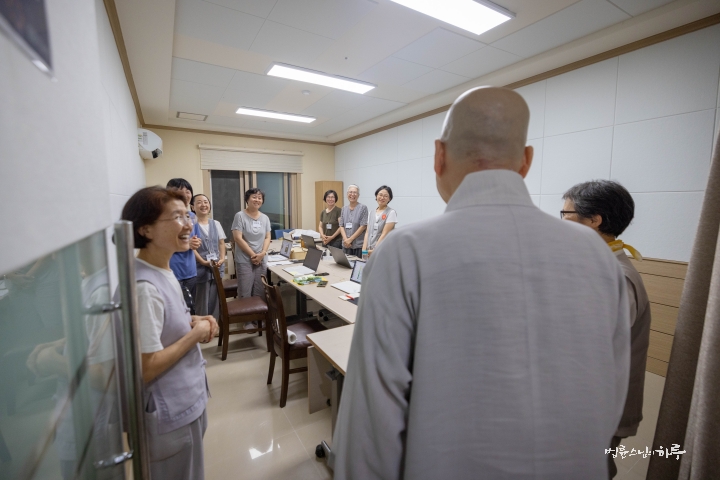
After exchanging greetings, Sunim went up to his room, proofread some manuscripts, and concluded his day’s activities.
Tomorrow, he will have a meeting with the Dharma teachers about the pilgrimage to India in the morning, inspect the summer meditation retreat preparations while touring the retreat center, and meet with volunteers who are on sick leave. In the afternoon, he will move to the Mungyeong Retreat Center to have a dialogue with the Sangha members, hold an online meeting with JTS India staff at the Meditation Center, and then go to the Bonghwa Retreat Center in the evening to check on the preparations for meditation and summer practice. After that, he will return to Seoul.
A Day in the Life of Sunim was translated by AI.




